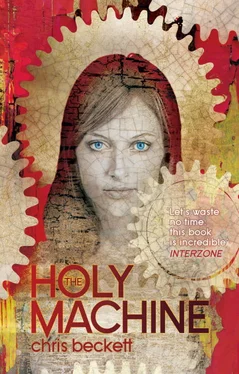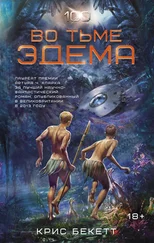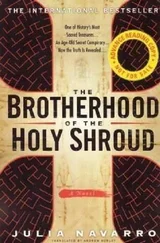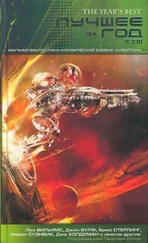He insisted on having me get out and look at a street where they repaired and sold firearms. There were not only shotguns and hunting rifles but automatics, machine guns and even improvised grenade launchers made by sawing the barrel off a rifle and welding onto it a cup made out of old olive oil cans.
‘They are used for fishing,’ he said. ‘You fire a grenade into the middle of a shoal and – bang! – thirty fat fishes in one go!’
I wondered what else they were used for, and why Manolis thought they might be of interest to a visitor from Illyria.
As we returned to the car an elderly woman accosted us. She was a Vlach, as Manolis told me afterwards disdainfully, an Aromune, one of a dwindling mountain tribe who speak a Latin language and are said to be the descendants of Roman soldiers. She wore colourful clothes, but her hands had been reduced by leprosy to blackened stumps.
‘Help me, please, in the name of mother Mary,’ she intoned in a kind of stylized whine which seemed to be common to Ioannina’s many beggars.
Manolis snorted.
‘No good talking about Mary, old woman. He’s from the City.’
‘In the name of the City, then!’ wailed the old woman. ‘In the name of the big silver tower in the sea!’
Manolis laughed, climbing back into the car and turning the key in the ignition. But I was touched by her invocation of the silvery Beacon. I gave her a twenty-drachma note as I got into my own seat.
As we roared off in a thick cloud of exhaust smoke, the taxi-driver gestured towards a small side street.
‘Down there are experts in documents. If you ever need a passport or an ID card… I’ve taken more than one of your compatriots down there who wanted to start another life.’
Why would any Illyrian want to start another life out here, I wondered? I’d never heard of such a thing. Illyria was entirely populated after all by refugees from this outer world. But it seemed that the Outlanders were privy to aspects of my home-land that were unknown to me.
Manolis seemed to sense my bewilderment.
‘I’ve been to your Illyria my friend,’ he said, ‘I worked there for a time. I know what it’s like. Clean streets, nice homes, no one goes hungry, no one has to be in pain… But in the end it will drive you crazy. Nobody can live like that forever.’
I shrugged. ‘Well, I suppose most of the rest of the world has come to the same conclusion,’ I began to say, then broke off with a gasp of pure horror.
We had come to a dusty square in the centre of which there was a kind of gibbet. It was festooned with dismembered bodies, severed limbs, heads…
Manolis laughed.
‘You see, even your demons can’t stand it there! Look how many of them we have caught!’
Only then did it dawn on me that the limbs and heads were not human, but parts of robots.
* * *
I made him stop so I could get out and look. There were the remains there of half-a-dozen machines. The sad silver heads of two big security machines were impaled on poles. Nailed below them were the pink bodies of a couple of smaller plastecs: the type used as shop assistants and janitors and waiters. One of them, deprived of all its limbs, was hanging precariously upside down, perhaps dislodged by stone-throwing children of which several were even then enjoying some target practice. Its head, with its mild pink face, dangled by a couple of wires from the rest of the frame.
It was Shirley!
Or if it wasn’t the robot janitor from our apartment block it was certainly an identical model.
Manolis was rolling another cigarette, watching my reaction with amusement.
‘How did they get here?’ I asked him.
He shrugged. ‘You City people should take more care of your demons, my friend. They just wander over the border. I don’t know what they are looking for, but of course we destroy them.’
‘Why?’
He snorted.
‘Because they are blasphemies, mockeries of God’s creation.’
Epiros was a Greek Orthodox state, but the reason he had given me was precisely the same one that had been given, all those years ago, by the Protestant mobs in Chicago when they broke to pieces my mother’s beloved Joe.
Oily flames pouring upwards from a laboratory window…
A preacher with a megaphone in a white suit…
The poor, the marginal, the surplus to requirements, streaming in their thousands through the campus, seething with energy and rage…
‘God is not mocked, God is not mocked!’
There, there, Ruth, there, there…
The trade talks were supposed to resume at three, but when Manolis brought me to the Archbishop’s headquarters at 2.30 p.m., the two Illyrian negotiators were waiting anxiously outside. And to my surprise both men piled hastily into the back seat of the taxi.
‘Thank God you’ve finally got here,’ they said. (For Illyrians did still say ‘Thank God’). ‘We need to go straight to the airfield. The helicopter is on its way.’
Both of them were experienced middle-aged men (one a Japanese-Illyrian, the other of French origin), who up to now had seemed to be dealing quite calmly and competently with a slow and frustrating task. But both were now in a fever of agitation.
‘What’s happened?’ I asked.
The French-Illyrian, Claude, made frantic hand signals, pointing at Manolis.
I reassured him that the driver spoke no English at all.
‘There’s been trouble back home,’ said the Frenchman. ‘There’ll be a reaction here. It won’t be safe until we’re back in the City.’
Frowning, Manolis looked at me, glanced back at the negotiators and then frowned at me again. He was suspicious. He could sense the tension and he was wondering what he’d been excluded from.
‘Tell him to turn off his radio!’ said the other negotiator, Tojo. (Manolis had been listening to some crackly bouzouki music). ‘The news may come through any time now and then he won’t want to drive us.’
‘Tell him my colleague here has had a heart attack and we have to get home urgently,’ the Frenchman said.
I told the taxi-driver that the Japanese-Illyrian was very ill and needed quiet.
Manolis frowned, looked dubiously back at Tojo, and very reluctantly turned off the radio.
‘A thousand drachmai, to the airport,’ he said coldly.
We agreed without further argument.
‘There’s been a big squippy demonstration back home,’ Claude explained to me tersely (‘squippy’ was a derogatory term in those days for guestworkers, many of whom were Albanians, or Shqips ). ‘Some people have died, most of them Greeks. We need to get out of Epiros before the news spreads.’
But the news was already spreading. We could actually see it, like a weather front moving across a landscape. For a little while the people in the streets were still just as they’d been all morning and over the last two days. Then there were more signs of agitation, more groups conferring, more glances towards our taxi and the three of us inside looking very Illyrian with our clean-shaven faces and our white, collarless suits.
Then someone threw a stone at us.
Then someone else shouted.
Then the car started to be jostled: fists were banged on the roof, doors were kicked, faces glared through windows.
Someone delivered a hard kick to Manolis’ door. He wound down his window and roared out abuse.
‘About thirty died,’ said Claude (he was listening to the news through an ear-set as he spoke), ‘Epirote Greeks, almost all of them.’
‘Atheists! Murderers!’ people were beginning to shout at us. A group of youths made to block our way.
Manolis put his foot down, scaring them out of his way by sheer ruthless speed.
Читать дальше












